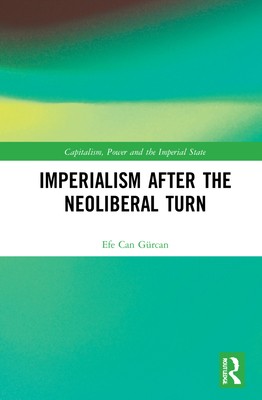
- We will send in 10–14 business days.
- Author: Efe Can Gürcan
- Publisher: Routledge
- ISBN-10: 0367263513
- ISBN-13: 9780367263515
- Format: 15.6 x 23.4 x 1.1 cm, kieti viršeliai
- Language: English
- SAVE -10% with code: EXTRA
Reviews
Description
This book explores how imperialism has been evolving in the neoliberal era, with the aim of providing a systematic and integrative understanding of the inner dynamics and vulnerabilities of the contemporary imperialist system. Asking how it has been possible to sustain an imperialist system that fails to address the problems of unemployment, declining standards of living and globalizing conflicts, the author draws upon theoretical and empirical contributions from the current literature to further recent efforts at re-conceptualizing imperialism under the conditions of neoliberal globalization and advances a critique of the school of transnationalism in global political economy. The author puts forward that contemporary imperialism rests on a triangular structure composed of (a) economic imperialism, which is driven by a neoliberal logic of maximizing monopoly profits at massive societal costs; (b) military imperialism, which is shaped by the neoliberal transformation of the US military-industrial complex with the rise of private armies, the globalization of narcocapitalism, and the weaponization of Islamist terrorism and ethno-religious divides; and (c) cultural imperialism, which is led by the media- and nonprofit-corporate complexes, having weaponized the media and civil society in manufacturing popular consent. The book's arguments are also extended to the current challenges of imperialism embodied in the rise of the BRICS, post-hegemonic forms of regional cooperation, and global popular resistance. As such, it will appeal to scholars of politics and sociology with interests in globalization, imperialism, capitalism, and global power.
EXTRA 10 % discount with code: EXTRA
The promotion ends in 21d.12:35:19
The discount code is valid when purchasing from 10 €. Discounts do not stack.
- Author: Efe Can Gürcan
- Publisher: Routledge
- ISBN-10: 0367263513
- ISBN-13: 9780367263515
- Format: 15.6 x 23.4 x 1.1 cm, kieti viršeliai
- Language: English English
This book explores how imperialism has been evolving in the neoliberal era, with the aim of providing a systematic and integrative understanding of the inner dynamics and vulnerabilities of the contemporary imperialist system. Asking how it has been possible to sustain an imperialist system that fails to address the problems of unemployment, declining standards of living and globalizing conflicts, the author draws upon theoretical and empirical contributions from the current literature to further recent efforts at re-conceptualizing imperialism under the conditions of neoliberal globalization and advances a critique of the school of transnationalism in global political economy. The author puts forward that contemporary imperialism rests on a triangular structure composed of (a) economic imperialism, which is driven by a neoliberal logic of maximizing monopoly profits at massive societal costs; (b) military imperialism, which is shaped by the neoliberal transformation of the US military-industrial complex with the rise of private armies, the globalization of narcocapitalism, and the weaponization of Islamist terrorism and ethno-religious divides; and (c) cultural imperialism, which is led by the media- and nonprofit-corporate complexes, having weaponized the media and civil society in manufacturing popular consent. The book's arguments are also extended to the current challenges of imperialism embodied in the rise of the BRICS, post-hegemonic forms of regional cooperation, and global popular resistance. As such, it will appeal to scholars of politics and sociology with interests in globalization, imperialism, capitalism, and global power.


Reviews